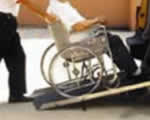 Go to main content
Go to main content
Archive Website of the UK government
Please note that this website has a UK government accesskeys system.
Main menu
Page menu
Disabled people

Air travel if you are mobility impaired

A mobility impairment should not stop you from travelling by air. The important thing is to plan ahead and contact your airline, travel agent or tour operator. You need to let them know what assistance you will need at the airport or on the plane.
Booking and advance notice
If you will need help, make sure you give the airline at least 48 hours notice before you travel. This way, the airline can plan ahead and provide you with the help you need at the airport.
Travelling by air may mean that even if you are normally independent you will need help. For example, if you have walking difficulties you may find that you’ll need to use an airport wheelchair or buggy to get to the gate.
Wheelchair users
Airlines should let you carry up to two items of your mobility equipment free of charge. You must tell the airline when you book your flight so that they have the details of your wheelchair or scooter. This is particularly important if you have a powered/electric wheelchair or scooter.
Seating on board an aircraft has to meet air safety regulations. Because of this, you can't take your own wheelchair into the passenger cabin of a plane. It will be stored in the hold of the plane.
Wherever possible you should be able to stay in your own wheelchair until you reach the side of the plane. You will then need to move into an airport wheelchair to board the plane (larger aircrafts may have on-board wheelchairs).
When you'll change chairs will vary between airports. It will depend on what facilities and equipment are available for the staff to get your wheelchair to the aircraft.
If the plane is joined to the terminal building by an 'air-bridge' or tunnel, you should be able to stay in your own wheelchair. This will only be until you reach the door of the plane, where there will be level entry into the passenger cabin.
If the plane is parked away from the terminal, passengers will have to use a flight of stairs to board. Or they will have to use a scissor lift, which allows level access. You will have to transfer into a boarding chair or on-board wheelchair:
- at the departure gate
- on the ground outside the plane
- at the vehicle you travelled to the plane in
If your wheelchair has to be specially packed, you may need to transfer into an airport chair at check-in. This often applies to powered/electric wheelchairs or scooters.
Travel insurance
Airlines are not required to provide full compensation for loss or damage to mobility equipment. Before you travel, you should make sure your travel insurance provides good cover for your wheelchair.
Toilets on board aircrafts
Some airlines are redesigning aircraft interiors to provide toilets that are wheelchair accessible. However, for some time to come aircraft toilets will generally remain inaccessible for some disabled air travellers. For more details check with your airline.
If you need assistance to reach the toilet, cabin crew can push the onboard wheelchair and offer general support. But they're not allowed to lift passengers or assist with toileting.
If you are worried about continence on a long journey, there is a range of possible solutions. You might wish to discuss the possibilities with a continence adviser at your local health centre or hospital. The Disability Living Foundation's "Flying High" leaflet includes helpful advice on this subject.
Airline policies
Some airlines may ask you to prove why you need some facilities or services, like seats with extra leg room. This helps them to give priority to those people who really need these facilities, which are often in limited supply. You should not be asked to provide proof just for requesting assistance.
Different airlines have different policies. The airline or travel agent will tell you when you book what information you need to provide.
An airline is entitled to require that a passenger travels with a companion if the passenger is not self-reliant. For example, you’re unable to look after your own personal needs such as using the toilet. To travel alone, you should be capable of moving from a passenger seat to an on-board wheelchair. Cabin crew are not allowed to lift passengers in and out of seats for health and safety reasons.
Legal rights
Under European law, disabled people and other people with reduced mobility have legal rights to assistance when travelling by air. There is detailed information about this on the website of the Equality and Human Rights Commission (EHRC).
 Facebook
Facebook Twitter
Twitter StumbleUpon
StumbleUpon Delicious
Delicious Reddit
Reddit